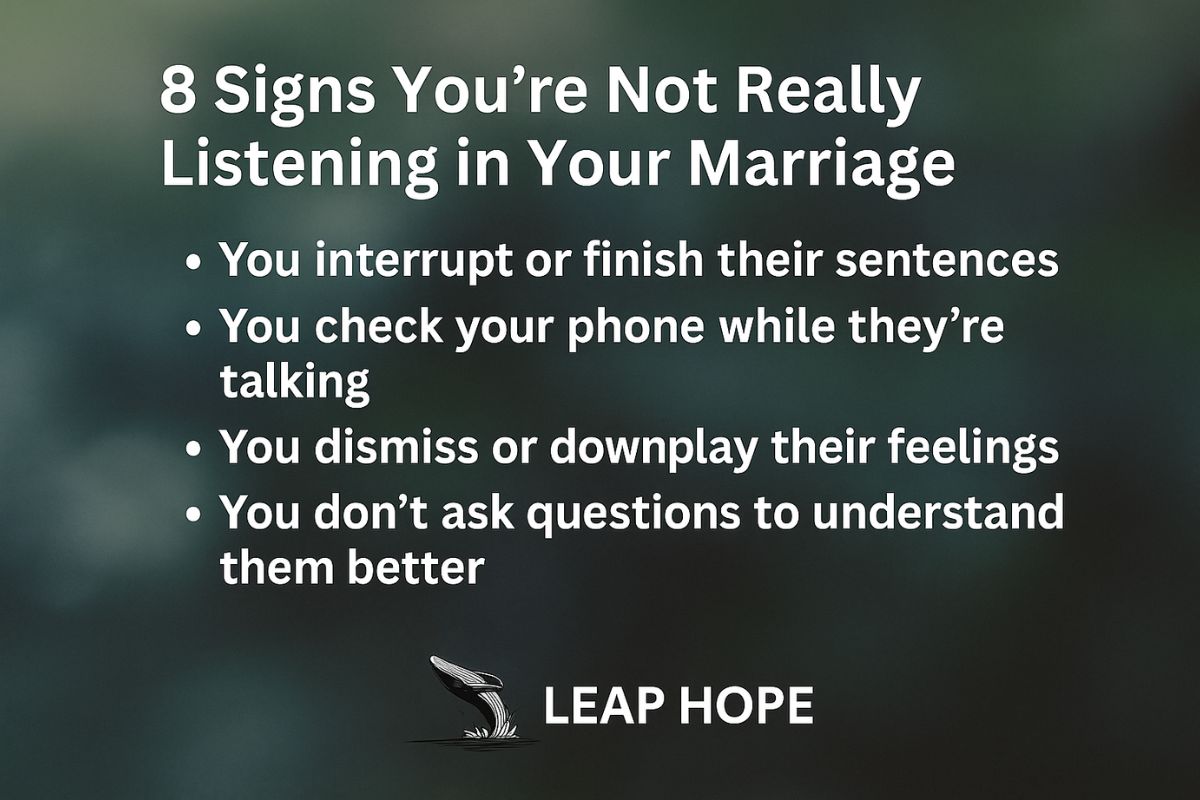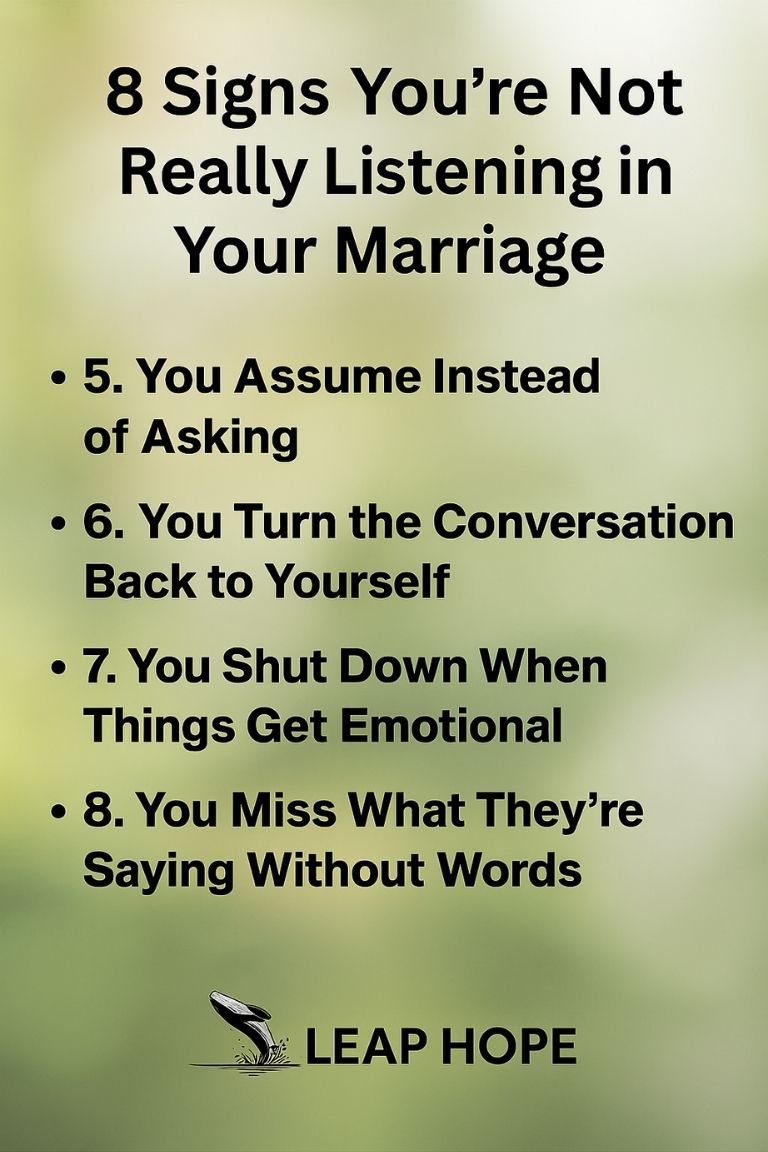Have you ever thought, “I am listening,” but your partner says, *“You never hear me”?
Do your conversations turn into arguments, even when you’re just trying to talk?
Are you hearing their words but missing what they’re really trying to say?
If any of this feels familiar, you’re not alone, and you may not be truly listening in your marriage.
According to a recent study, 46% of couples say they argue weekly over miscommunication or mishearing. And it’s not just about words, it’s about presence. In fact, nearly 1 in 4 couples say that “phubbing” (ignoring your partner to scroll your phone) has created serious issues in their relationship.
The truth is, most people think they’re listening.
But what they’re really doing is:
- Waiting for their turn to speak
- Skimming the surface of what’s being said
- Assuming instead of asking
In this article, we’ll walk through
8 Signs You’re Not Really Listening In Your Marriage–
1. You Interrupt or Finish Their Sentences
You might think you are helping, or you may believe you already know the answer to their question. Interrupting might feel to them as though they are not being heard.
You might look like you are listening while your mind may be preoccupied thinking about something else. This pseudo-listening can damage the bond over time. Interrupting ruptures communication and, after some time, actually leads the individual to withdraw as they are taught, “Why bother? You are not listening anyway.”
Though it may seem trivial to you, what it conveys to the person is this:
What I have to say matters more than what you are saying.
Consider these alternatives:
Let the person finish — even if it takes a minute.
Ask the question, “Did I get that right?” when you are unsure.
Consider taking a pause before responding; it conveys that you truly care.
2. You Check Your Phone While They’re Talking
You might think it’s no big deal, just a quick message or scroll. But to your partner, it feels like you’re saying,
“That screen matters more than you do.”
There’s even a name for it: phubbing (phone + snubbing).
And it actually damages relationships, less connection, more conflict, and a growing emotional gap.
They feel ignored. And that hurt can quietly build up over time.
Try this instead:
- Put your phone down or out of sight.
- Make eye contact, just for a few minutes.
- If you really need to finish something, say, “One sec, let me wrap this up,” then give them your full attention.

3. You Dismiss or Downplay Their Feelings
Your partner opens up, and you say something like,
“It’s not a big deal,” or “You’re overreacting.”
You probably meant well, maybe trying to calm things down. And when that happens enough, they stop opening up.
That’s how emotional distance grows, not with fights, but with silence.
Examples:
They say, “I felt left out.”
You say, “You’re too sensitive.”
They say, “I’ve been feeling off lately.”
You say, “We’re all tired.”
See the pattern? They needed empathy, not fixing.
Try saying instead:
- “I didn’t know you felt that way. Tell me more.”
- “That makes sense. Thanks for sharing it with me.”
4. You Don’t Ask Questions to Understand Them Better
When your partner shares something important and you just nod or give a quick “okay,” the conversation often stops there. And so does the connection.
Real listening isn’t passive, it’s active.
If you’re not asking follow-up questions, you might be hearing them… but not really trying to understand.
They say things like:
- “What was that like for you?”
- “Did something specific make you feel that way?”
- “What do you need from me right now?”
5. You Assume Instead of Asking
It’s easy to think you already know what your partner means or how they feel.
But when you assume instead of asking, you often get it wrong, and that creates distance.
Maybe they’re quiet, and you think they’re mad… but they’re just tired.
Maybe they say something small, and you take it the wrong way… because you didn’t ask for clarity.
Real listening means checking in, not guessing.
Try saying:
- “Can you explain what you meant by that?”
- “I want to make sure I understood you right.”

6. You Turn the Conversation Back to Yourself
Your partner opens up about something personal, and without meaning to, you flip it to your own story.
They say, “I’ve been feeling anxious.”
You say, “Yeah, me too, work’s been awful.”
It might seem like bonding, but it shifts the focus. Over time, they might feel like there’s no space for their feelings.
This is called conversational narcissism, and most people don’t even realize they’re doing it.
Try this instead:
- Let their story stay front and center.
- Ask a question before sharing yours.
- Say, “That sounds tough. Want to talk more about it?”
7. You Shut Down When Things Get Emotional
Some conversations feel too heavy. Your partner is upset, emotional, or even crying, and you just… freeze. You go quiet. You look away.
But when you shut down in emotional moments, your partner might feel abandoned — even if that’s not your intention.
They’re not looking for perfect words. They’re looking for presence.
And silence in those moments can feel like you don’t care.
Instead of pulling away, try small responses like:
- “I’m here.”
- “I’m not sure what to say, but I’m listening.”
- “Tell me what you need right now.”
8. You Miss What They’re Saying Without Words
Sometimes it’s not what they say — it’s how they say it.
They might say “I’m fine,” but their tone is off. Or “It’s whatever,” while clearly shutting down.
If you only hear the words and miss the vibe behind them, you could miss what they’re really trying to say.
Body language, tone, silence — they all matter. Sometimes, more than words.
If something feels off, try gently asking:
- “You sure you’re okay? It doesn’t really sound like it.”
- “I feel like something’s bothering you. Want to talk?”
Final Thought About You’re Not Really Listening In Your Marriage
If a few of these points hit home, don’t beat yourself up.
You’re not a bad partner — you’re just human.
Life gets busy. We get tired, distracted, and stressed. And sometimes, without meaning to, we stop really listening.
But not feeling heard is one of the biggest reasons couples drift apart.
You don’t need to get it all right. You don’t need to be perfect.
Just start small:
- Put your phone down when they’re talking.
- Ask one real, caring question.
- Let them finish before you respond.
Frequently Asked Questions About You’re Not Really Listening In Your Marriage
How do I know if I really am not listening?
If you tend to interrupt them, check your cellphone, brush off their feelings, or cut in with your own story, chances are they probably do not feel heard. These little things add up.
Can bad listening skills ruin a relationship?
Yes, very much so. The moment somebody perceives you as not listening to him or her, he or she starts to withdraw into himself or herself. Misunderstandings pile up, and eventually, resentment takes root. That is of the big reasons couples grow apart.
What is phubbing, and why should I care?
Phubbing occurs whenever one person is paying more attention to his or her cellphone than to his or her significant other. Even in the absence of any intention to slight, it still sends the message of neglect and disregard.
Why does my partner think I don’t listen when I think I do?
You hear the words but miss the feelings; real listening is seeing through the tone and body language to be really present with somebody instead of just being in a room.
How can I nurture my listening ability within marriage?
Be simple. Throw away the phone, look at your partner and just listen to what he or she has to say. Ask questions just to dig deeper.




